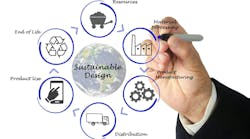Emerson optimizes recycling process to increase sustainability of waste-to-energy production
Emerson is helping the Swedish cleantech company HaloSep to optimize their unique process that turns hazardous incinerator flue-gas residue from waste-to-energy plants into usable materials. Emerson’s control technology and software is being deployed at HaloSep’s plant for optimization, research and technology (PORT) in Gothenburg, Sweden, to manage a chemical-separation process that recovers valuable salt, metals and minerals from fly ash. By providing an alternative to landfill disposal, the HaloSep process increases the sustainability of the waste-to-energy industry.
"Due to the irregular nature of household waste, fly ash produced from incineration has varying properties requiring different separation processes. Our PORT plant will analyze fly ash samples from around the world, test specific separation processes and demonstrate circular economy benefits to potential customers,” said HaloSep President Staffan Svensson. “Emerson’s technology and expert advice on implementing automation throughout the plant has played a vital role in optimizing these processes, which when deployed, will help increase the sustainability of the waste-to-energy industry.”
Emerson designed and implemented a scalable control-system architecture at the PORT facility and worked closely with HaloSep to develop unique separation sequences to efficiently recycle fly ash with variable compositions, they claim, adding that the Emerson’s DeltaV distributed-control system is ensuring the safe and efficient operation of the separation processes. In addition, DeltaV Live software is providing high-performance human/machine interfaces for operators, with key performance indicator-led dashboards providing intuitive reporting and management and supporting optimized decision-making and operational performance, per Emerson.
“Emerson is committed to helping our customers in industries such as plastics, lithium-ion battery manufacturing and waste-to-energy generation, to meet today’s growing industrial, processing and energy demands through sustainable innovations that minimize environmental impact,” said Nathan Pettus, president of Emerson’s process systems and solutions business. “Emerson’s technologies and expertise are designed to handle the complexity of HaloSep’s recycling process.”
HaloSep, a subsidiary of the Stena Metall Group, provides an on-plant solution that can be built locally at a waste-to-energy plant or placed at sites where fly ash from smaller plants is consolidated, eliminating long-range transportation costs and emissions.



